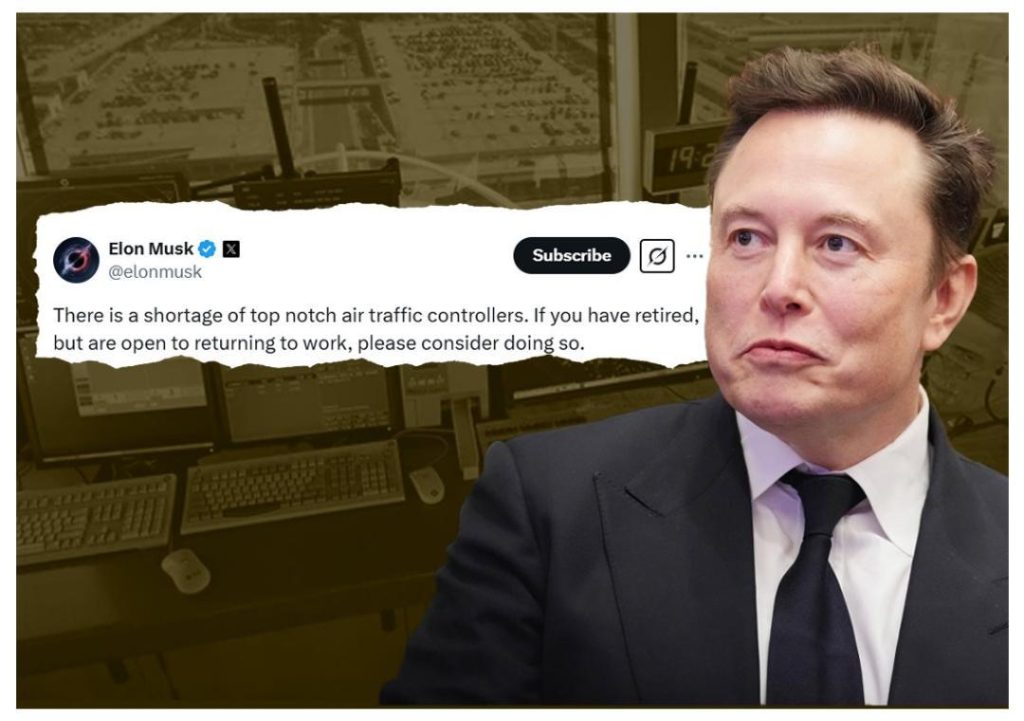
Elon Musk Urges Retired Air Traffic Controllers to Return: A Solution to the Severe Shortage?
In a bid to address the severe air traffic controller shortage plaguing the United States, Elon Musk has made a surprising proposal – urging retired air traffic controllers to return to work. The shortage, which has been affecting the aviation industry for months, has resulted in a significant increase in delays and runway incursions. With the Federal Aviation Administration (FAA) short nearly 3,000 controllers, Musk’s proposal offers short-term relief, but long-term reforms are needed to ensure aviation safety.
The air traffic controller shortage is a critical issue that has been gaining attention in recent months. The FAA, responsible for overseeing the country’s air traffic control system, has been struggling to recruit and retain new controllers. The shortage has resulted in a significant increase in delays, with some airports experiencing wait times of over an hour. Moreover, the lack of controllers has led to a rise in runway incursions, with a staggering 1,115 reported incidents since May 2024.
New York TRACON, one of the busiest air traffic control facilities in the country, is operating at just 65% capacity, exacerbating the issue. The facility is responsible for guiding aircraft taking off and landing at John F. Kennedy International Airport, LaGuardia Airport, and Newark Liberty International Airport, making it a critical hub in the regional air traffic control system.
Musk’s proposal, while unconventional, highlights the severity of the issue. The billionaire entrepreneur, known for his innovative approach to solving complex problems, believes that retired air traffic controllers can play a crucial role in bridging the gap. In a statement, Musk emphasized the importance of experienced controllers in maintaining air traffic safety: “Retired air traffic controllers have vast experience and knowledge that is invaluable in ensuring the safety of our skies. Their return to work would provide immediate relief to an industry facing unprecedented challenges.”
While Musk’s proposal may offer short-term relief, it is crucial to address the underlying causes of the air traffic controller shortage. The FAA has been working to increase recruitment and retention efforts, but more needs to be done to attract and retain talented professionals in this critical field.
The shortage of air traffic controllers is not a new issue. In 2019, the FAA reported a shortage of over 1,000 controllers, which has only worsened over the years. The agency has implemented various initiatives to address the shortage, including increasing salaries and benefits, but the problem persists.
One of the primary reasons for the shortage is the grueling work schedule and high-stress environment that air traffic controllers face. Controllers work long hours, often for extended periods, and are responsible for making life-or-death decisions in a matter of seconds. The physical and mental toll of this demanding job can be significant, leading many controllers to leave the profession early.
Another factor contributing to the shortage is the lack of diversity in the air traffic control workforce. Historically, the profession has been dominated by men, and there is a need for more women and minorities to enter the field. The FAA has been working to increase diversity and inclusion in the air traffic control workforce, but more needs to be done to attract and retain a diverse range of professionals.
The air traffic controller shortage has far-reaching consequences, not only for the aviation industry but also for the broader economy. Delays and cancellations can have a significant impact on businesses and individuals, particularly those who rely on air travel for work or leisure.
In conclusion, while Elon Musk’s proposal may offer short-term relief, it is crucial to address the underlying causes of the air traffic controller shortage. The FAA needs to implement long-term reforms to ensure the safety and efficiency of the air traffic control system. This includes increasing recruitment and retention efforts, improving working conditions, and promoting diversity and inclusion in the air traffic control workforce.
As the aviation industry continues to grow and evolve, it is essential that we prioritize the safety and well-being of air traffic controllers. By doing so, we can ensure that our skies remain safe, efficient, and reliable for generations to come.
Source: https://ascendants.in/globally-trending/musk-calls-on-retired-air-traffic-controllers-to-return/






